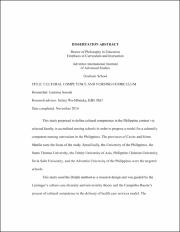Cultural competence and nursing curriculum
Abstract
This study purposed to define cultural competence in the Philippine context via
selected faculty in accredited nursing schools in order to propose a model for a culturally
competent nursing curriculum in the Philippines. The provinces of Cavite and Metro
Manila were the focus of the study. Specifically, the University of the Philippines, the
Santo Thomas University, the Trinity University of Asia, Philippine Christian University,
De la Salle University, and the Adventist University of the Philippines were the targeted
schools.
This study used the Delphi method as a research design and was guided by the
Leininger’s culture care diversity and universality theory and the Campinha-Bacote’s
process of cultural competence in the delivery of health care services model. The
Delphi technique that is a method of collecting data through rounds of interviews, then,
survey questionnaires for the purpose of reaching consensus, served as the method of data
collection. This study took place in the Philippines and the data were collected
throughout the months of February, March, and April 2014. Fourteen nursing experts
made the sample of this study. They were recruited purposively through the given criteria
that helped to provide a homogenous sample. The data was collected through an
interview guide of 11 open ended questions for the 1st round and 2 follow up Delphi
questionnaires of 89 and 17 items for the 2nd and 3rd rounds.
The findings revealed that the participants defined culture as having a visible and
a shared dimension that is passed on from generation to generation. The participants
defined cultural competence as an awareness towards diversity and an ability or skill that
is acquired through an educational process. The findings also revealed that Philippine
core values can be grouped into six themes: (a) love, (b) relationship, (c) spirituality, (d)
health, (e) tolerance, and (f) patriotism. It also revealed that Philippine core values are
essential for Philippine nurses. Regarding the curriculum model, the participants opted
for (a) a mixed approach of Byerly’s models of multicultural education, (b) a mixed
approach of traditional and transformative methods of teaching, and (c) the use of
Leininger’s theory and Campinha-Bacote’s model.
These findings proposed clear guidelines for the curriculum model which was
concluded to be based upon a Christian and humanistic philosophy of caring with the
Philippine core values being drivers of the development of the baccalaureate nursing
students. The theory of Leininger was used for the integration of transcultural concepts in
the curriculum while the model of Campinha-Bacote served as an assessment tool. The
program’s objectives and core competencies were also drawn from the Campinha-Bacote
model and from the nursing experts’ definition of cultural competence. A mixed method
of Byerly’s approaches to multicultural education guided the organization of the content
along with Leininger’s theory. Finally, the teaching methods were guided by the choices
given by the nursing experts.


